Lyn Johnson and Sara Sparhaw of West Tenth, and Amanda Ducach of SocialMama, joined EmberTribe's very own founders to discuss their journeys as SaaS app entrepreneurs and how they've juggled their passions for helping women with their drive to grow start-ups.

The following interview excerpts from episode three of Founders Forum have been edited for length and clarity. You can download the full transcript here.
In this interview:
Introductions
Josh: Hello and welcome. Thanks for joining us here on another episode of the Founders Forum, really excited to dive in today because our guests are going to kind of bring a new flavor to the conversation, just in terms of the products they built and the communities that they've cultivated. So without further ado, let's just dive right in. Amanda, why don't you go ahead and introduce yourself and your business first.
Amanda: Thanks for having us. We're so excited to be here. So I have a community for moms (SocialMama) where we connect women to the mom, friends that they need, and the licensed experts they can trust for support on their journey of motherhood. And if you want to join us, you can find us on the app store or Google play totally for free.
Lyn: I'm Lyn Johnson and Sarah is my co-founder, we're co-founders of West Tenth. The West Tenth is a marketplace that's connecting you to the home-based businesses in your town from local home florists to home bakers organizers. We're trying to make these invisible entrepreneurs that exist all around us more visible, easier to access, easier to work with.
Josh: Well, thank you all for joining us. And if anybody's checked out the previous episodes, they know this is just designed to be a conversation. Folks are just like a fly on the wall as if we were all having virtual coffees or beers together. So yeah, we appreciate your time today.
What motivated you to take action and start your business? What steps did you take?
Josh: I thought what we could do is maybe go back to the beginning and think about the early days of when you were validating the idea for both your respective businesses, what was kind of the genesis story and maybe what was the first step that you took to take action? You know, that's usually a really big bridge to get over, so feel free to jump in. Whoever's inspired first to kind of go back to the genesis story.
Amanda: Sure, I'm happy to. I'll try to keep it to like 30 seconds. Normally the founder stories are like 30 plus minutes and you know, they're always full of crazy ups and downs. I mean, ours is no different than I think most entrepreneurial ventures, it's full of ups and downs. So some are really high and some are really low, but we really started very organically. We weren't out looking to be big tech entrepreneurs, but basically we got a phone call in the middle of the night from my best friend who was hysterically crying in an emergency room next to her two year old child that unfortunately he just received a new medical diagnosis. And then through the next couple of weeks, we really watched her spiral using words like loneliness and depressed and anxious, where she had never used these really deep words.
And we all knew it was the catalyst of what was going on in her journey of motherhood. So I'm married to a technologist who's now the CTO of Social Mama and he basically was obsessed with “I'm going to find her a tool that will match her with women who also have children with the same medical need.” And we're gonna, you know, show her the light at the end of the tunnel. And when it didn't exist, he became obsessed with creating it. I said, no.
So it started with him putting together a PowerPoint presentation and presenting it to me at the kitchen table. Still said, no. But I promised him I would do a competitive analysis for him since marketing was my background. It was something I was very comfortable doing. And we just realized quite quickly that this wasn't just moms that have children with unique medical needs. It was all moms, that 85% of moms felt lonely and unsupported. And then we came up with a matching tool that would help moms get that support and, you know, ups and downs. And then here we are a couple of years later and, you know, getting movement and it's exciting.
Josh: That's fantastic. What were some of the substitutes? So there were no real direct competitors for what you wanted to build, but what were some of the substitutes that moms were using, I guess, to try to fill that gap.
Amanda: Yeah. And they're still using some of those substitutes and that's, it's a really interesting question. Because we're constantly being asked, like, how are we different from a Facebook group or Reddit page? We're different in so many different ways. And I do not see them as direct competition. Our goal is not to get you off of Facebook or off of Reddit by any means. But there are two things that we do really differently.
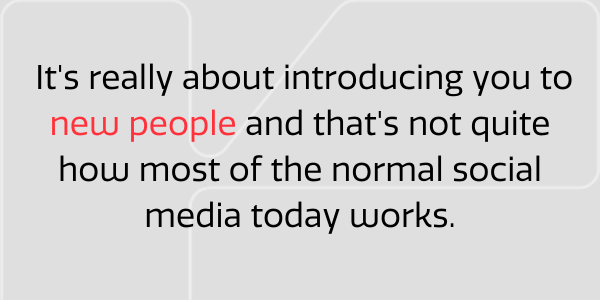
So first of all, we are one-on-one friendship matching. So the mom comes on, she creates a profile and there's a compatibility algorithm that shows her women in her area and we help facilitate that friendship. So it's really about introducing you to new people and that's not quite how most of the normal social media today works. The second thing is that we have licensed vetted experts that are on our platform.
Amanda: So OBGYNs, doulas, mental health therapists. That exists to keep mom-shaming and judgment as low as possible and mitigate the misinformation that we so often see in a lot of social networks now. So when you add those two elements, it makes us so different. But people are still going to places like Facebook groups to try to find mom friends. I'm not sure how well it's working. But it does work for great things like neighborhood pages. That's a great example of where I think that's a good resource to go to
Josh: Fantastic Lyn or Sarah, whoever wants to jump out. I'd love to hear about the early days of West Tenth. What were some of the initial inputs, sparks things that made a real, so
Lyn: West Tenth, the basis of it is we say we're connecting you to home-based businesses. But what we know is there are 30 million women in the United States alone who don't participate in the traditional workforce. And if they're, most of them are leaving to give care to their families while they're gone, they give amazing care to their families. They uphold our communities. They work for free in our churches, in our nonprofit organizations, in our schools. And we do them a huge disservice by not really providing them good ways to onboard back in traditional work when, and if they're ready, which women as a whole become really financially vulnerable in this country.
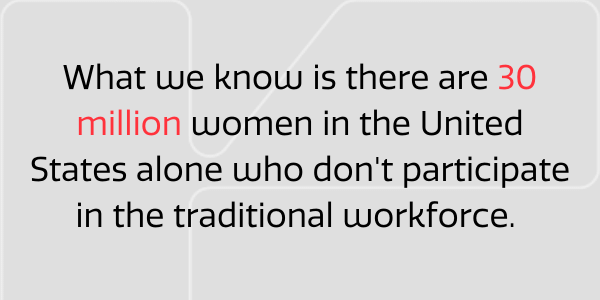
So I started my career out as a finance professional, Sarah and I both did. Sarah left finance. I stayed in it, but it was just immensely concerned about the gender wealth gap, where women only own about 32 cents and financial resources to every dollar that men own.
I knew that a big reason for this was because women jumped out of the workforce. And like I said, they do amazing things while they're gone. And then we repay them by giving them no options to regain financial stability, women Intuit, this, they know this, they know they have needs for flexibility and that the marketplace isn't valuing their skillsets. So millions of women in the United States are starting businesses from home.
They are taking the skills they developed in the home and starting businesses that serve their communities from those skills. So they know they're fantastic bakers. They start a home baking business. They know they're fantastic at organizing family vacations, you know, so they start doing that for the families and friends around them. And right now the only place for them to advertise those businesses is really in social media where there's so much noise and it was very difficult to find them.
So we built this platform so that we can aggregate these women, make it easier to find them to work with them, put money in their pockets. And so that busy families like mine could easily reach out to them, not have to sift through social media and noise to find out, but reach out to them and bring their talents into our own homes. So that was the genesis of West Tenth. And Sarah, do you want to, I want to hand it off to Sarah to tell you her story about how she got involved.
Sarah: Lyn texted me one day. I think it was her first day of graduate school. And I was like, do you want to build a company? And I was like, I'm in, we had no idea what we were going to do. And when Lyn kind of came across this in her research I love this idea. I've had too many friends who have stepped away and have had a hard time getting back into the standard workforce and not finding the flexibility that they need. And their options are really, really poor. They can go into an MLM. They can just volunteer in their community or they're turning to creating their own business from home. And so I loved like, Oh, we can help bring them to life. But I actually had a personal side to the stories when I grew up, my mom was a stay-at-home mom and she actually had her own home-based business.
And she ran it for a couple of years and then kind of lost access to where she got her marketing list and this was pre-internet. And so she actually had to shut down her business. And if West Tenth would have existed when, when she was around and, and growing that business, she'd still be around today. And so I just saw a lot of value. My mom wanted to contribute to our household's income. She needed the flexibility and she was pursuing something that she was passionate about and really good at. And I, I just was like, we've got to find the women around us who are doing it and, and make them visible to their community.
Josh: I think you both really do a good job of paying attention to your surroundings. So whether that be a friend in crisis or just the macro trends that you're noticing or something you're reconciling from your childhood, it's just that paying attention to where the problem is where the pain is but then also taking that next step of actually really taking action on it.
So that's one thing I wanted to ask is both of your businesses rely in some way, just in terms of like a critical mass, they rely on there being enough people already adopting it for it to be valuable.
How did you build momentum and reach more app users?
Josh: So like, how did you get that started? Like, what was the first step for you to get an interest or whatever it took to kind of getting to that critical mass of users to make this thing valuable, whether it be vendors or, you know, other moms that are trying to look for support. Amanda, let me go over to you. Like, what were some of the first steps that you took to get that momentum of the rock kind of rolling down the hill as it were?
Amanda: Yeah, I'm trying to think back. It feels like it was so long ago that we had to start them. I mean, it's hard, right? Like it's not easy. And even when you have a larger community, then it's, you know, retaining the community and trying to get the network effects of the community.
I think for us, we were really lucky that we have a population that is already looking for a solution to their friendlessness and don't have a lot of options to go to. So a lot of the moms that are on our platform or the moms-to-be, are finding us through natural search. So they're going to the app store and they're literally searching in the search bar, like an app for friends.
So in the beginning it was really natural. It was when one mom found us, we happened to be in the app store. Then she told three friends, but, that's really what it comes down to is when you don't have the marketing dollars. And even when you do have the marketing dollars, you of course want that perfect mix of unpaid and paid acquisition, but it's really about getting your network to recommend you to three more people plus.
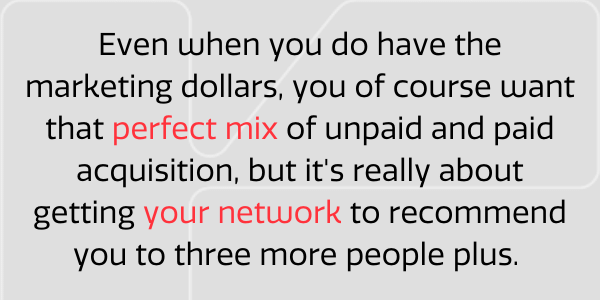
And now what we're starting to move into now that we're bigger than we have some real traction is working with companies like, like Sarah and Lyn's company where the product-market fit is so similar because like the whole time they were talking about the genesis of their story, that is the conversation that happens in our app every single day, right? Like every mom's like I had to leave my job. I need income. I don't want to go to an MLM. So being able to connect them with companies like Sarah and Lyn’s, it is that full circle partnership with kind of helping the community grow, but also helping the company grow. So that's really what we're moving into now.
What are some strategies you use to get engagement? What worked and what didn’t?
Josh: So I guess both of you are also, you know, relying heavily on this community aspect, whether it's, that's the centerpiece of your business, connecting people with one another, or you're developing this, you know, new, modern, main street community.
So like, when we think about things like engagement, you know, what are some of the things that you guys did really well and maybe things that didn't work out so well to getting that initial engagement? That initial kind of traction with people interacting with one another and creating value for one another or some things that worked well. And what are some things that that you tried that maybe didn't work?
Sarah: So we have sellers, we have these women who are running businesses and we're building community through providing them not only like networking events and providing a way for them to meet each other, but we're layering it on with education. And so we're bringing them together and filling in those educational gaps of what they need as a micro business and providing them a safe space to share what are their challenges, what are their success, and actually bringing them together to teach each other.
We typically have an expert amongst the group that can help solve one another's problems. And we're finding that that community is really important for building our marketplace. And it not only helps provide better businesses and better sellers on our platform, but it also helps us bring additional people to our platform because they hear about it. They talk to their friends about the support that they're getting. And then it's just kind of this flywheel of more and more people wanting to join us. But I think it's not just a networking event. Those are great, but you're bringing them together and they're, they're sharing common experiences and being able to help and uplift each other. And that's really what makes that community special.
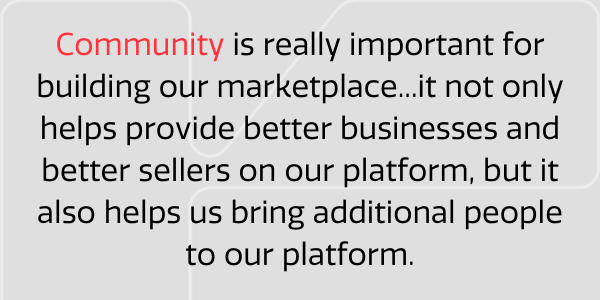
Lyn: Yeah. And I'll say, I'll add to that. We're also trying to create community between buyers and sellers. So local is a big part of our value proposition. We're trying to help you see these invisible entrepreneurs that are in your community. And what we built as our UVP was really meant for more service type businesses or goods as a service, you know, get a custom-themed cake from your neighbor or have a home organization. Cause we thought, you know, we didn't want to compete with Etsy. It turned out that we have a lot of people who want to sell goods on the marketplace to their local community too. So we ended up accepting goods, but we just kind of stumbled on this really interesting insight and trend was that what people, what our customers enjoyed most was not only were they buying something locally, that they were getting to know the people on our platform.
We hadn't built this passive experience. We can build this experience where you needed to contact them and collaborate. And so our customers found, Oh my gosh, now I have my pottery person. Now I have my baker in my community. Now I have that person who can come help organize my garage once a quarter. I have a person. So we felt like our customers are building a team. And so our product is going to continue to, even though we're making it easier and easier, we're going to continue to rely on what we call conversational commerce, where you actually get to know the people that you're buying from and create relationships with them. So that's another part of our community. That's important.
T.J.: Cheers, Josh, to jump in, like in terms of like entrepreneur, maybe this is for Lyn and Sarah, like for entrepreneurs who maybe have started their business for the first time. Are you guys getting feedback on how the platform has kind of empowered them in a way it feels like there's also a kind of this empowerment element to what you guys are providing that, you know is it also not just what's selling goods and services, but goods as a service, but it also feels like there's a lot of instilling positive change from like empowering people to, you know, be their best self.
Lyn: Yeah. I mean, we definitely are addressing a small confidence gap, right? Like when women leave the workforce, we kind of actually helped them to feel like they have no skill sets. All of us. We know that that is absolutely not the case and the places that they have, where they can list their business on Facebook and on social media make it seem like it's just a hobby.
So our feedback is when we get people who are in the early stages and they're on our app, they all of a sudden start to feel like they're legitimate business owners because we display them that way. And we talk about them that way. We don't say things like mompreneur, we don't say things like side hustle. We say you're an entrepreneur. Yeah. So we legitimize their business in a lot of ways. And then we're just a support system for them to answer questions. And we connect them to other people who are running businesses. So they get a lot of confidence that way. That's really good.
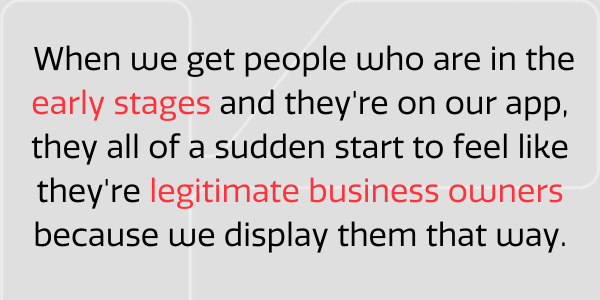
Sarah: And I think to that point is they can charge market value for their services. So when you're just casually, my neighbor is asking me to do something or someone asks you on Instagram. It's really easy for them to be like, can I get the friends and family discount? Like you're always discounting to get their business. And here it's like, no, I can find people who really value my services at like the market rate. So that, that helps them.
Josh: I like that you call it the confidence gap and I'm not sure if the confidence gap ever goes away completely for a founder at any stage, but there does seem to be that kind of like price of admission where people feel they're waiting on permission or they're waiting on feeling like they have the credentials. And we all know that you'll never feel like you have all the credentials needed to jump out and do what you're doing.
What advice would you have for any entrepreneurs who are listening to this?
Josh: What advice would you have for any entrepreneurs who are listening to this? They may be women. They may be men, but like they might be in those early stages of feeling like, Hey, I don't have what it takes to do this. I have the work ethic and the ability to work hard, but I don't know that I have the credentials. Like, what was your encouragement be to that man or a woman who is kind of on the front end of wanting to launch something.
Amanda: I mean, none of us have the right skills to do it. You figure it out, right. That's the founder job title is you, you mess up and then you figure it out and then you do it right the next time. And then you try to give back to other founders so they don't have to mess up as bad. Right. At least I think that's what we all kind of strive to do.
But I think I had this fallacy that the imposter syndrome, which is like the name we give it, obviously like quite a bit it's, it's referenced as the imposter syndrome, but I really fooled myself into believing, like I would fake it till I made it. And then the imposter syndrome would go away, but it never goes away. You just get to a bigger conference table or a bigger stage.
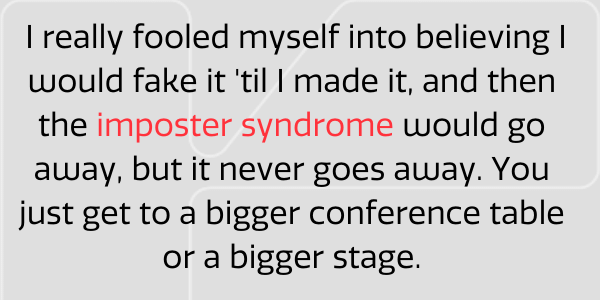
And then you just feel just as much like an imposter as you did on day one of being like, what does VC stand for? Like you, you know what I mean? So like, you think you're not going to have to fake it till you make it, but you do. And I think as I've gotten into those bigger stages, all that I've learned is everybody else feels the exact same way.
Like the person doing a keynote to 7,000 people, he was doing it to 5,000 people the day before. So everybody feels like that. And, and I will tell you, women are worse at it. It is in general. I find women founders unable to own that and move forward. And we have to do a better job as females to be like, listen, we are the right person to do this. And finally, I'm at the point now where like, I know that whatever venture capitalist I'm talking to, whatever potential partner that I am, the one in the room that knows the most about my industry, my product and my customer, and that there's nobody on the earth that knows it better than me. And that's, I think, what you have to own.
How have you pinpointed inflection points for growth in your business?
Josh: One thing that, you know, gets a lot of the headlines and the attention are the growth moments and the moments where, whether they're margin scale or small, these inflection points where you just start to get a lot of traction, you know, whether that be user growth, installs transactions, however you're measuring it. Can you think back to some of the times where you've started to have those spikes, they could be recent. They could even just be early wins that were small, but what led up to them? What were they and what led up to them?
Lyn: Yeah. I can speak to this a little bit. One of our first key inflection points was just like the days and weeks where we all, all of a sudden started to see more people using our platform that we didn't know than that we did personally know, and that took longer than we thought it would.
So I mean, one of our early inflection points was just that when we saw, you know, strangers using the app, which hallelujah, and another inflection point for us was when we needed to fundraise. And we had some press around that. We saw a spike and usership go up then. And then recently we just kind of had a small, organic inflection point.
It felt like where things just started to come a little bit more smoothly, where they're still very, very hard, but there, it just eased up by about 2% and we're like, okay, something's happening. We gotta keep it going and make sure next month it eases out by another 2%. But those have kind of been the inflection points for us.
Amanda: It's funny because I think a lot of the times the inflection points that make me excited are done very privately. So like, it's great when you're in the Wall Street Journal and everybody sees it, it's this big deal. And they're like, you made it and it's exciting and it's incredible, but like, no, I actually made it when I refined my CAC for the first time. Like when I understood exactly what that customer acquisition cost.
So it was like, for me, that was the moment more than getting into Wall Street Journal, but nobody sees those moments besides you, and you know, obviously some of your leadership team and whatnot, but I think it's about trying to own both and appreciate them and celebrate the wins. Cause that's another thing I think sometimes it's hardest to really celebrate it. Cause we all live in the future of our product versus our customers who live in the present of our product.
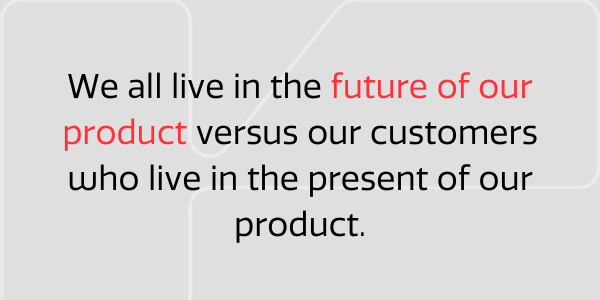
Amanda: So I think there's always this psychological gap that happens. And I'm trying to really appreciate both, like I will say like Lyn, the best part I have to agree with you is that turning point of when you're like, wait, I don't know that woman, or like, wait, how did she get here? And how did she find me? Oh my God. And she wrote us a nice app store review. Like how does Marina even know us? Like that's still to this day, even years later, like nothing makes me happier than waking up and finding five positive reviews that I went to bed not knowing about—still the best part of my job.
What can you share about your experience with imposter syndrome and feelings of doubt as a founder?
T.J.: We touched on it earlier. I thought I want to go back to it, but we talk a lot about imposter syndrome and things like that. I think a lot of people have this idea that, you know, everyone's just kind of going at it alone. But what they don't see is all the people kind of in the background, you know, helping support and, and have helped them along the way. So have you guys had much experience with that or maybe, and maybe even if it has been lonely or has been you know, something kind of a struggle in that way, maybe you could share something about that?
Sarah: Well, I can start first. I think having a co-founder is always a really good idea. I don't know how you do it just being a solo CEO. So that's one recommendation. And then we were lucky we did a Techstars program last summer and we were kind of enveloped into an amazing community of peers who were kind of at the same stage. We were also introduced to other mentors and advisors. And so we feel like our community has grown exponentially over time.
It started out really small and then things transpired where now we have quite a large community where we feel like if we have a question, we can find someone who can help us. And that's really just critical because we face a lot of questions that we just don't even know where to start or are really conflicted and just being able to have that community. And then I think the last part is, I think having a therapist is great. Having a third party, just to be able to talk to about all the different stress that you have because your work life is just a sliver of it.
Lyn: There was a time before Sarah was able to join full-time where she was kind of advising us, but not full-time yet as a co-founder. And that was a lonely, lonely period for me, I will say. And also because it was at the very beginning where I knew this needed to exist, I knew we needed to build it. I had no idea how, and I also didn't know how hard the journey would be.
So when she came on full-time that was a real turning point for me as mentally as a founder. She's the kind of co-founder who, when we had a pitch meeting and we were in our fourth pitch meeting and they said no to us. And I came back to her and said, we got an email. And they said, no, she'd be like, Oh, they're the worst. They'll just regret it. Don't worry. Instead of being like, what did you do wrong? You know? So that was a turning point for me, was having a co-founder that I've had a really long history with and I just trust immensely. And then also just say family, I mean, we've had both of us immensely supportive families. Sometimes they've believed in our product more than we have in the diet and the times when it's been hard and that has been incredibly important and amazing.
Amanda: Same, I mean, it's, so whenever women come to me and they want to start, especially if it's like scalable tech, I'm always like, you have to go find a co-founder like, go forward if you want on your own. But like it is, I don't know how anybody does this without a co-founder.
I have one she's not here on screen, but I do have one. And like Lyn, I started it by myself. And I remember the turning point when we brought her on for my emotional sanity and for the company's growth. And then we're also a Techstar company and I get that Techstars acceptance rate is really low and that some people listening to this, they might be trying to get into some like a Y Combinator, but there's startup hubs in most big metropolitans. Founder Institute has a lot of amazing programming, there's Facebook groups.
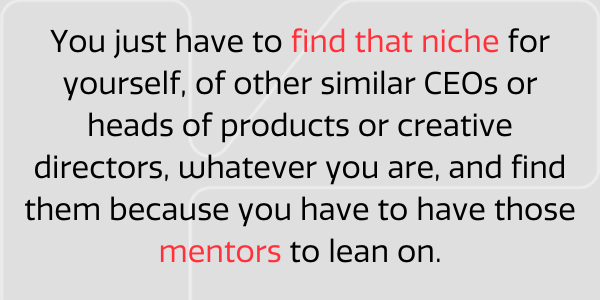
So you just have to find that niche for yourself, of other similar CEOs or heads of products or, you know, creative directors, whatever you are and find them because you have to have those mentors to lean on. Or, I mean, really, I think that you'll break if you don't have them truly.
Do you have any thoughts on what goes into recruiting a great co-founder?
Josh: So you referred to the Techstars network as being like a, you know, a bonus for finding different players in the team. But I would love to hear from both of you, if you have thoughts on just what goes into a good co-founder search, like, what should you look for? Do you want to get the person who's closest to you?
Like, what are some, I guess some ways maybe you'd find those people, if somebody is not in an accelerator and maybe like, what's the, I guess internal mental model or framework, it doesn't have to be that defined, but like your operating system for making that decision, like what, what goes into that?
Lyn: That is a super good question. And I think the answer is honestly different for every founder and their story, right? So for me, bringing Sarah on... and I'd had someone who I, who was an early co-founder, who ended up leaving and really, she was a terrific human being, highly capable, lots of work ethic, but the driving force just wasn't there. And her personal circumstances just didn't really allow her to continue where Sarah and I were, we've known each other for years and years.
There's a lot of trust. We've also been able to put ourselves into a situation where we could take the financial risk for at least a little bit of time. And so being able to share that financial risk with someone with another co-founder is just really big. And to, you know, not take it on just yourself, that was big for us.
And I think that something that's been important to us is we have complementary skill sets, but we, so they're not the same, but we really are in sync about like, why we're doing this and who we're trying to serve. We don't have wildly different visions for the company. They may not be exactly the same, but we're in sync on so many things and that's been important in our founder relationship. Yeah, so I don't exactly know how you just go out and find that, but I think everyone has relationships in their life that match something like that. And, they should lean into those.
Amanda: I mean, it's a marriage, a founder relationship is absolutely a type of marriage. And I think you have to go into it like that. So you could talk about things like, can you not take a salary for a couple of years? Is that a make or break for your family? Do you want to have children? Do you see yourself doing this in 10 to 15 years? What would an exit look like to you? Like those are real questions.
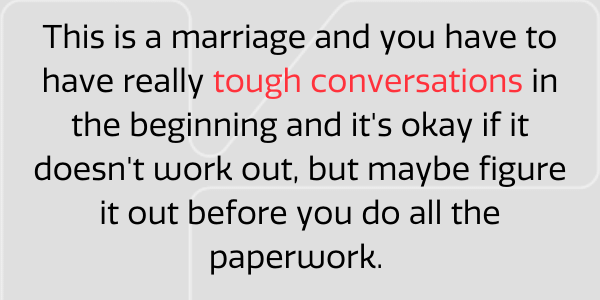
And I think it's like the difference between, you know, when you're dating and you're looking for something casual versus marriage, I would assume that, you know, when you're on your first date, if you want to be married by the end of the year, it'd be a very different first date than if you were, you know, 18 and looking to go to college and move in a couple of months setting, you have to think of it like that. Like this is a marriage and you have to have really tough conversations in the beginning and it's okay if it doesn't work out, but maybe figure it out before you do all the paperwork.
Josh: And I think Lyn, your point just about having alignment around values, like that's something that I've seen go really well and go really poorly like TJ and I, ours are very similar in that respect, right? We share the same values for our team, for our families, for what we want to accomplish with the business. But I've seen other teams too, where it's like, if they don't have, even if you have the slightest misalignment at the co-founder level, it just gets amplified and more ambiguous and confusing as you scale the team. Cause that small misalignment at the top creates like a much wider gap as you, as you grow your teams. So that's a really great point.
Lyn: There's just immense amounts of stress and pressure put on the company and on you. So anything is amplified, you know, the good and the bad.
Josh: Totally. One thing both of you have mentioned is just the good fortune of having been mentioned in news outlets, like the Wall Street Journal, Forbes, and others in tech, like Tech Crunch, I think was something that both of you guys have been in.
What advice can you give about getting positive media coverage?
Josh: What are some of the tactical, I guess, pieces of advice you could give founders that are trying to get that placement, get that feature. And cause obviously it had a great impact, you know, as you were, as you were growing. So did you hire a PR agency? Did you just position? I mean, was it an investor network, like how'd you guys go about getting the coverage?
Amanda: Yeah, I mean, ours really has been a combination of three things I would say. So the first is I do have an amazing PR organization that I use. They're fabulous. She's a crazy go-getter, which I love about her. But we really started as friends first. So it was not like a paid PR relationship work. I gave her X amount of dollars every month with X amount of ROI expected. So I think the fact that we really believed in each other's missions as companies helped us really grow we're really like, you have to constantly be networking.
Like I get picked up now by national publications that I assume just discovered me, and then I'll find out a couple months later, like I'll meet that journalist at something and she'll be like, Oh yeah, well actually, you know, I, I saw your press release from three years ago.
I was like, Oh my God, like that networking actually produced something years later. So I think the old-school sales technique of like somebody has to see you 10 to 20 times before they really start listening is very true with PR. So you have to build those relationships and continue them going. And it takes a while for most networking relationships to return. And then, okay, press releases. You have to know how to write a release. You need someone to push a release. That's like baseline one-on-one you can do it yourself or hire a firm, but that is somewhat of a necessity, I think, to get picked up.
Lyn: Yeah, for us, we hired kind of a freelancer, really, really part-time just a few hours a month person to help us get that press release up and help us identify a media target list. It still took months and months. And really, we ended up just leveraging a lot of our investor networks and saying like, we need contacts at some of these places. Can you please look into your LinkedIn and see who you can get us in contact with? And that yielded some relationships with some journalists, but I'll also say, I just want to caution, like PR is great. And then, the coverage we've been able to get has been really building a foundation of credibility for us. So I think it is necessary to get some coverage, but that didn't necessarily turn into sales because a lot of these publications aren't exactly zoomed into our target audience.
So I just caution, like don't put all your eggs in one basket around PR like get what you need to get and experiment and see if it's helping you with your targets. But organic and other means are worth your time. Just as much as PR is. So like put it in your strategy bucket, but maybe don't think that the world revolves around PR or think that just because someone got PR that their company is growing like crazy. Cause that's just like, we've realized that too, is that nothing's a guarantee including PR.
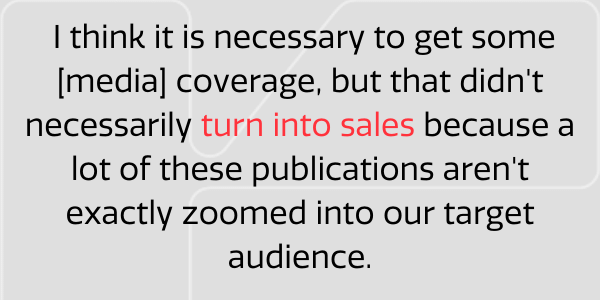
Amanda: You're so right. Lyn, I've always been surprised where at the beginning I was surprised that large press wouldn't equal large acquisition or conversion, but it really often doesn't, it matters for credibility for other things, but I'm so with you on that, we've seen the same thing. Yeah.
Josh: That's great. You got to find a way into the bucket of vanity metrics, right? Things that may have some indirect value for your ultimate goal, but are mostly just the most front-facing thing that people see and respond to. So whether it be a large round of investment or a PR mention or whatever might be that's great.
What are your favorite resources for learning as a founder?
Josh: So I guess as we're kind of winding down the conversation, I'd love to just get super granular, super focused and tactical. One thing that we found from all the founders we work with is that you’re lifetime learners, you're always finding new ways to get training or to get advice or to, to learn something. So what are some of your favorite tools for that? It could be podcasts. It could be books. It could be mastermind groups just to name a few, but what are the ways that you continue learning besides falling on your face and getting up again that you could share with other people?
Lyn: I like that you mentioned falling on your face and getting up again, Josh. Yeah, that's it. We continue to learn that way despite our best efforts not to do that. I mean, really, I think we look for one-on-one mentorship at this point. Like we've listened to all the podcasts.
We listened to How I Built This. I never listened to that podcast because I just realized that so much of the nitty-gritty is missing from those stories. And they're all success stories. Of course. So you know, we've, we've read books, all the books that have been recommended to us, we are sitting now in Clubhouse and still the most valuable thing for us is one-on-one mentorship. So we reach out to our mentors, when we know we have a skill gap or we have an immediate need, reaching out to these networks that we've built up over time and trying to find someone to just sit down with us for an hour to ideate.
And we lean on experts like your firm, Josh and TJ, the people that are working with us at EmberTribe to say, what about this? And thinking about our audience, or what about this? And thinking about how we grow, we lean on people.
Josh: A quick follow-up there, how would you approach a mentor? I mean, just even very, very specifically, like what's the email that you're right. It's cold to that person. Or do you ask for an introduction? Like how, how do you take that first step to kind of seek out that mentorship?
Lyn: Oh, introductions. So we look to the people that we know who are highly invested in our success, whether that's investors or people through Techstars that we've met, or just people in our past relationships who support us. And we say, we think you might know someone who's doing this either connect us to a specific person, or can you just think of someone that knows this? Like, can you think of someone who knows about digital marketing, right? And then they connected us to EmberTribe.
So it's looking at our networks and saying, does anyone in our network either have this skillset? Or could they know of someone that has this skillset? And could they sit down with us for a bit? And some of those have turned into more formal relationships, but yeah, that's what we do.
Josh: It's really good. And for anybody who's saying, well, that's great, but I don't have that initial network. So I'm starting from ground zero. I just want to recommend a shout out to Growth Mentor, and there's platforms like it, where you can go very, very niche with your need for expertise and find something many of them are actually willing to just jump on for free but you know, pay by the hour or whatever it might be. So if you're looking for that initial spark, I'd also recommend platforms like that to find people.
But Sarah, Amanda, like what are some of the other tools and resources, I guess, beyond mentorship that, that you're tapping into.
Amanda: I mean, finding those...if you're very early, cause I'm assuming that's more kind of, who's going to really want to know the answer to this. Like you need to find people that want to work with companies that are in the ideation stage. So like what are the right accelerators or mentor groups or hubs that exist that work with companies that are ideated or very close to that, because those are the people that want to work with you in your stage. I think it takes us all time to realize that this works based off of your stage, like whether you're looking for an investor, a mentor, a partner, a customer, it has to do with your stage.
And I do agree, I do agree with Lyn that like the, How I Built This and the Masters of Scale that they really do leave out a lot of the difficult parts. But I do think it's good when you're early to listen to those, but just keep in mind, like Lyn was saying that they do often leave out the really tough parts. So just keep it as inspiration. And there are a lot of little golden nuggets that are dropped in those conversations because you might hear them say something like, Oh, you know, our turning point of product-market fit was when we hired a digital marketing agency. Well, that could be gold for you if you didn't realize that a relationship with somebody like EmberTribe can help you understand how to refine your product-market fit.
That wasn't something I knew years ago.
So find people who are in marketplaces, they don't need to be exactly what you're doing, but for us finding other people who are trying to grow marketplace there's so much information out there and you can spend so much of your valuable time just searching and reading and going down rabbit holes that really aren't going to help you talk to your peers here. They probably sorted through some of that information too. And you guys can share and learn from each other and get headed in the right direction.
Josh: It's a great place to end. I just want to thank you all for your time. You've been really generous with your time, but your advice and kind of your openness. And I appreciate that. I know the listeners and whoever's watching this will too. So yeah. Thank you all for a fantastic job. And we will have links everywhere around this episode on where to find you and connect with you. But thanks again, and we hope that we can do this again sometime soon.
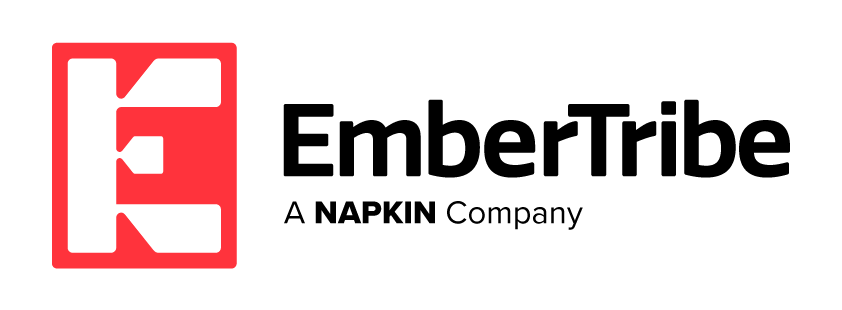

-AK-148968-preview.png?width=842&height=310&name=1.01-1x1px-Embertribe-(Client-Services)-AK-148968-preview.png)

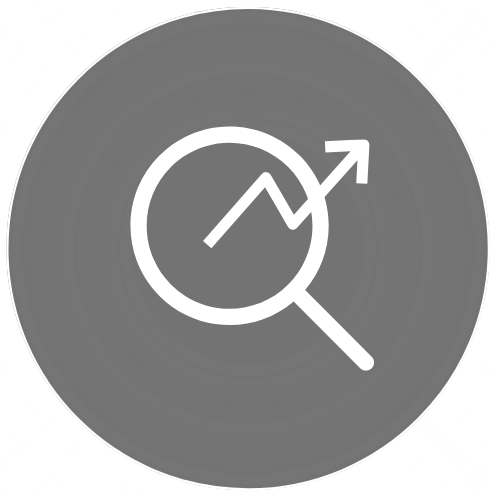
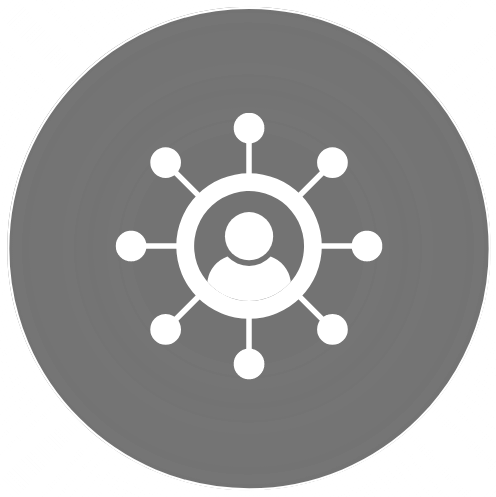
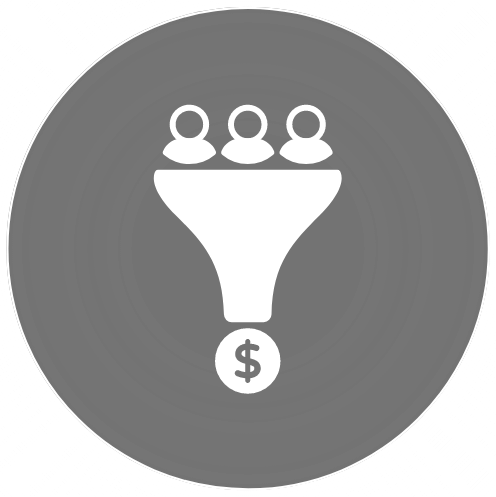
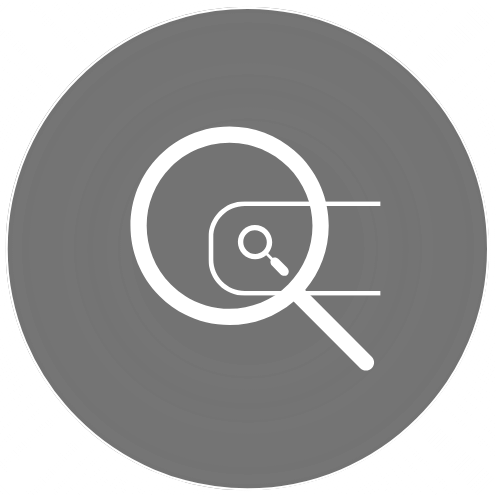
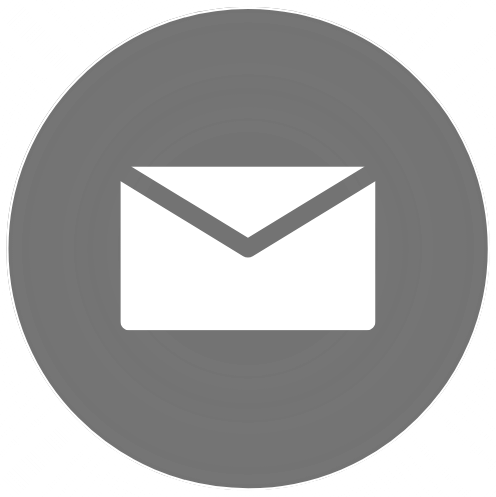
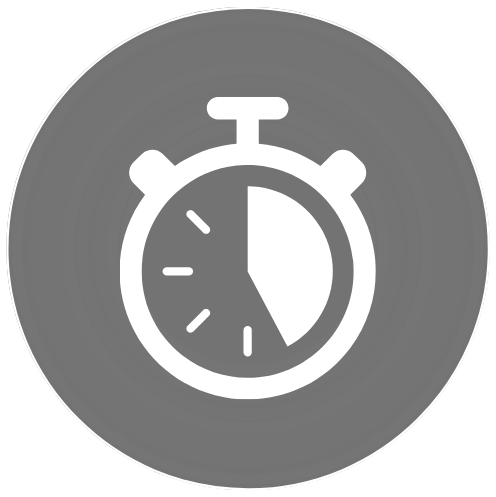

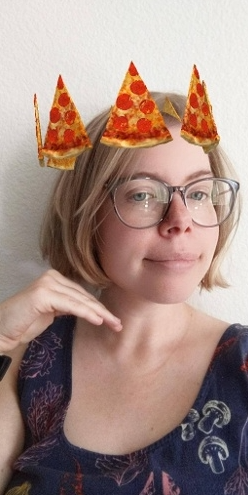











.png?width=810&height=810&name=TJ%20Jones%20-%20%20CoFounder%20EmberTribe%20(1).png)
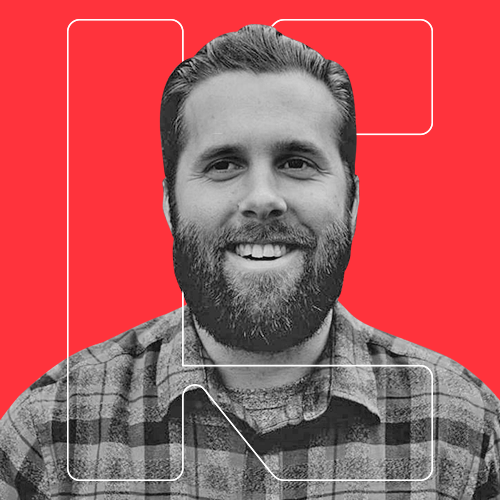
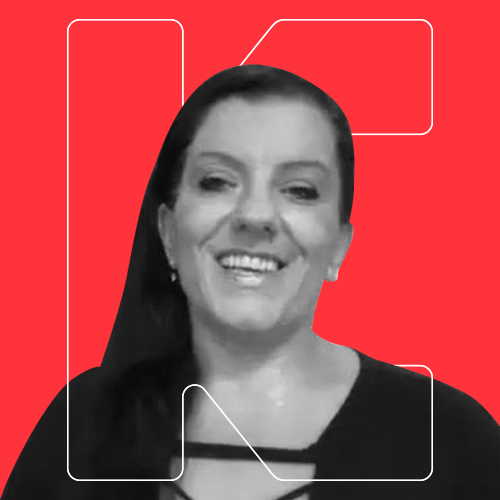
%20-%20500x500%20-%20SP%20-%2045.01.png)
%20-%20500x500%20-%20SP%20-%2049.01.png)
%20-%20500x500%20-%20SP%20-%2057.01.png)
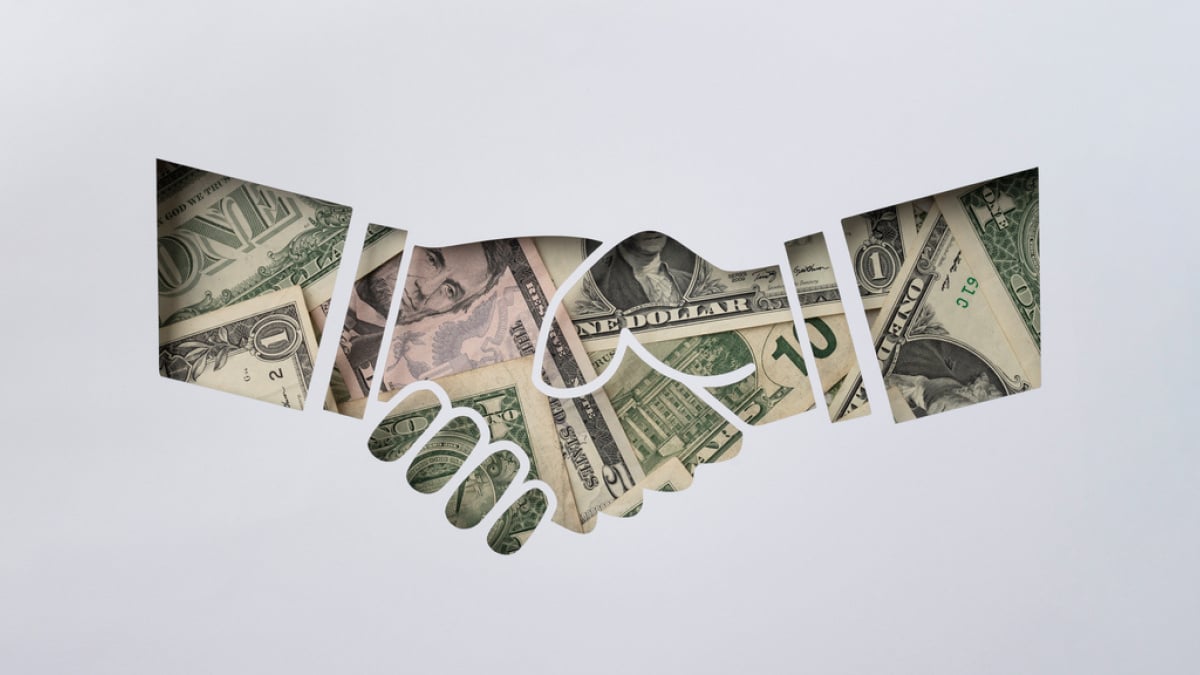
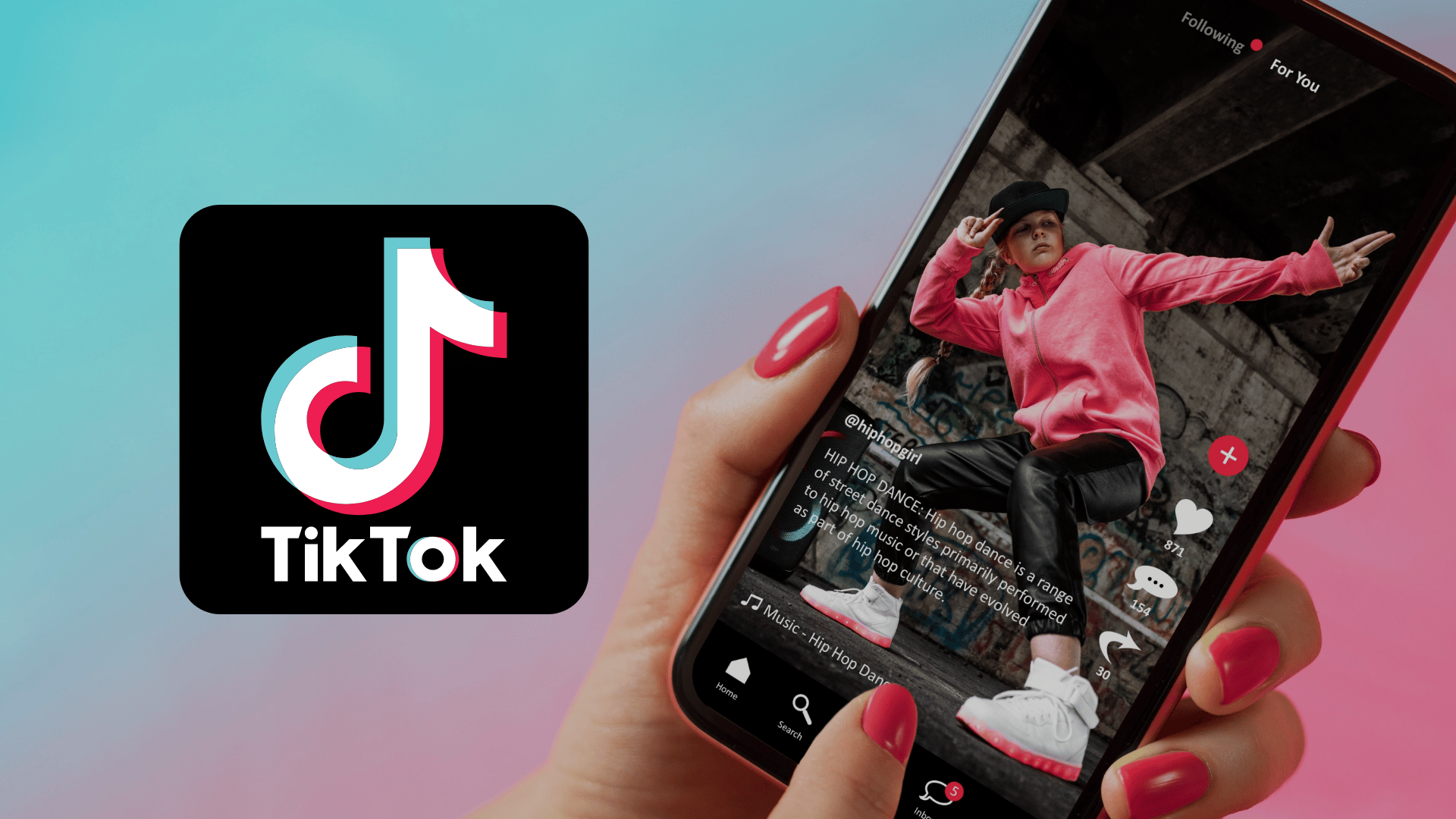
.png)